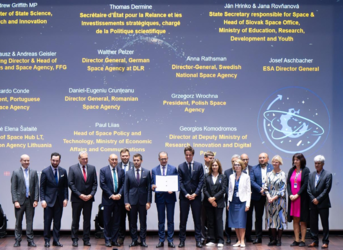

Zero Debris Charter goes intercontinental
The problem of space debris is one that all space-faring nations must face together. Today, New Zealand and Mexico were the first countries from outside Europe to sign the Zero Debris Charter, underlining the global nature of ensuring safety and sustainability in space.
“The Zero Debris Charter signals Europe’s unwavering commitment to be a world leader in reducing and remediating space debris, fostering collective action by a large community of space actors around the world,” says Dr. Salvador Landeros Ayala, General Director at the Mexican Space Agency.
“Mexico has not yet adopted a national regulatory framework on space debris mitigation. However, Mexico has always expressed to the relevant high-level bodies its work to develop mechanisms that will materialize the sustainability of our future activities in outer space.”
Since its publication in November 2023, the Zero Debris Charter has quickly gathered around it a large, growing community of international actors committed to a sustainable future in space.
Head of the New Zealand Space Agency Iain Cossar says New Zealand iss committed to the peaceful, safe and sustainable use of space. “We place a lot of importance on space sustainability in New Zealand and ESA’s Zero Debris Charter aligns well with our values,” says Iain Cossar. “Joining the Charter supports other actions we’re taking to address the issue of space debris, such as our policy enabling active debris removal missions to launch from New Zealand. We’re pleased to join this international effort to tackle a problem that affects us all.”
The momentum now continues with an additional 23 entities also signing the Charter at the 2024 International Astronautical Congress. This brings the total number of signatories to fifteen countries and over a hundred companies, research centres and international organisations, with many more having stated their intent to follow suit.
The Zero Debris Charter represents a collaborative effort within the global space community, serving as a foundational document and the start of an initiative. The community-driven charter covers overarching guiding principles and jointly defined targets to get to Zero Debris by 2030.
Signing the Charter is just the start. The goals and guiding principles of the Zero Debris Charter are currently translated into actionable and measurable technical targets through crowdsourcing within the community. New technologies will be developed that are necessary to achieve these realistic-yet-ambitious targets. Learn more about Supporting the Zero Debris Charter.
In the photo from left to right: Salvador Landeros, General Director of the Mexican Space Agency and Iain Cossar, Head of the New Zealand Space Agency, with behind them Josef Aschbacher, ESA Director General and Luca Parmitano, ESA astronaut.





